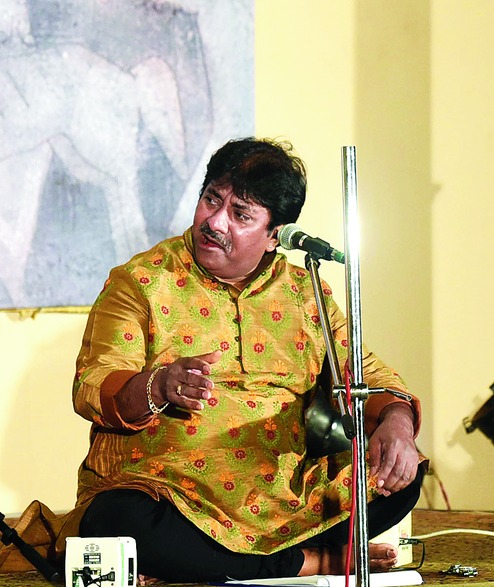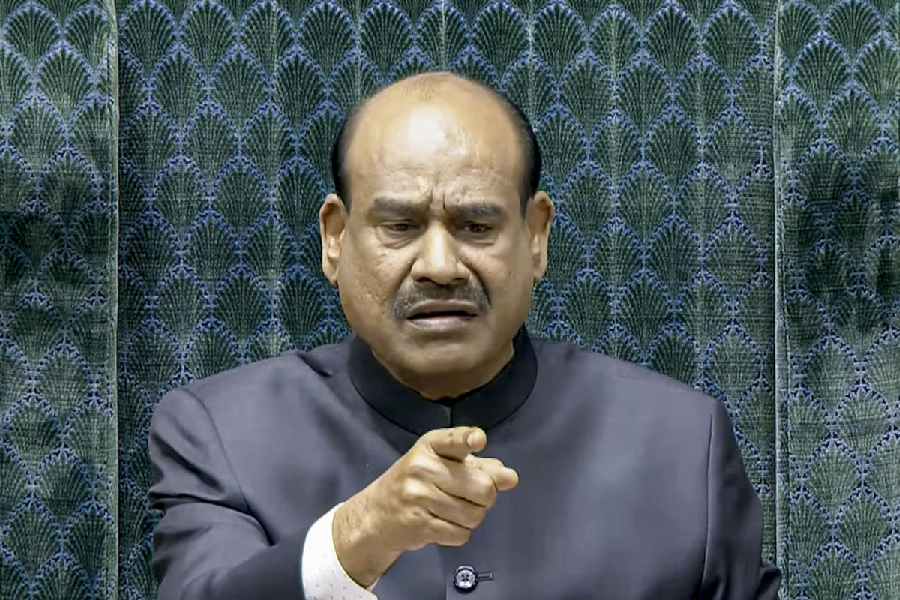
Music and literature, the two different streams of art, merged to create a new flow of festivity at the Ananda Purashkar, 2017 programme held in the Oberoi Grand. The soiree was an instance of the perfection with which music and literature can be woven together by a single thread. The evening of the most celebrated literary award ceremony of Bengali Literature became musical with the voice of Rashid Khan. The torch-bearer of the Rampur-Sahaswan gharana of Indian classical music, Rashid Khan is famous for his generous voice with its unconventional intricacies. But this performance was special, as the artist went out of his comfort zone and presented Tagore songs, which was a surprising treat for the audience.
He commenced with the song " Majhe majhe tabo dekha pai", based on Raga Kafi. Instead of the kirtan style, Rashid Khan focused on the rendition of the raga. The song was the creation of a young Rabindranath Tagore, written when he was only 23, and published in the famous literary magazine, Tatwabodhini Patrika, in 1885. He sang it himself at a conference of the Brahma Samaj held at Jorasanko. Rashid Khan began with a brief aochar, and with his command over the notes and the tunes, he brought out the charm of the song with skilful originality. As the artist continued, the beauty of the raga and the underlying sense of the lyrics blended perfectly.
Tagore's niece, Sarala Devi, got together a rich collection of Mahishuri tunes during her stay in Mahishur and she could not rest until she had offered her treasure to her adored "Robi mama". This she records in her autobiography, Jiboner Jharapata. According to her, Robi mama picked up the tunes and the resultant songs flourished with his magic words and timeless sense of beauty. "E ki labonye purno pran pranesh hey" was originally composed for the Maghotsav in 1893. Rashid Khan's melodious movement along the keynotes at the beginning brought out the fragrance of Bengali nostalgia and sentiment associated with this well known and eternally new song. The artist was able to recreate the beauty of the unique combination of spring, love and exuberance with his voice in full bloom in the three octaves that the song demands. He created a magical ambience as he removed the thin line between a structured format and the playfulness of a classical composition; his voice moved through the shades of the ragas while the audience enjoyed the feel of the ragas and the essence of the lyrics simultaneously. His sparkling, yet controlled, taans with small pieces of vistaars did not disturb the totality of the harmony. The assistance of Biplab Mandal in percussion added a new dimension to this performance.
Rabindranath was deeply influenced by the tappa of Shori Miyan, "Ho miya bejanuwale", and penned the song ," E parabase rabe ke" in 1885 as well. Tagore's dearest niece, Indira Devi, did the notation of this song, which was based on Raga Sindhu and composed in madhyaman taal. Audiences are used to listening to this song without tabla or taal in general, but Rashid Khan was an exception as he sang it in perfect accompaniment to the taal. He also delivered the most difficult phase of the song with utmost spontaneity without hampering the mood of the tappa. Although the accompaniment of Biplab Mandal on the tabla, Jyoti Goho on the harmonium and Murad Ali on the sarengi created a vitalizing rhythm throughout the programme, the strings of Murad Ali's sarengi perfectly evoked the quintessence of this particular song and the mellifluous fingers of Jyoti Goho enhanced the charming effect remarkably. With this song Rashid Khan's arresting performance came to a conclusion.
Tagore resides in the deepest niche of the Bengali's heart and mind and the immense depth of his songs are probably the best expression of his philosophy of life. Rashid Khan sensitively touched what the Bengali mindset holds most precious and proved that he is able to eradicate all the fine lines between musical genres with his scintillating voice and sensibilities even when he steps out of his chief area of expertise.
The wonderful amalgamation of music and literature in the evening of this year's Ananda Purashkar is best expressed in the words of T.S. Eliot: "...music heard so deeply/ That it is not heard at all, but you are the music/ While the music lasts.''










